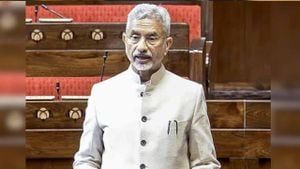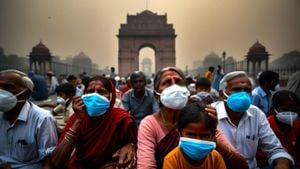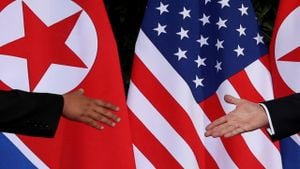A magnitude 7.3 earthquake struck Vanuatu on December 17, 2024, causing extensive damage and sparking fears of significant casualties. The tremor hit just off the east coast of Efate, around 30 kilometers from Port Vila, at 12:47 PM. Witnesses reported violent shaking lasting approximately 30 seconds, and the Vanuatu Broadcasting and Television Corporation (VBTC) indicated substantial destruction across the capital.
The earthquake severely impacted the La Casa D'Andrea e Luciano building, which houses several embassies, including those of the US, UK, France, and New Zealand. Dramatic footage shared online showed parts of the building collapsed onto the first floor, prompting immediate concerns for the safety of personnel. Fortunately, according to France's Pacific envoy, Veronique Roger-Lacan, diplomatic staff were unharmed. Australia’s Foreign Minister Penny Wong confirmed the safety of employees at the nearby Australian High Commission.
Australian Prime Minister Anthony Albanese stated, "We are closely monitoring the situation in Vanuatu following this afternoon's devastating earthquake. We stand ready to support Vanuatu, as the extent of the damage is assessed. Vanuatu is family and we will always be there in times of need." His sentiments were echoed by New Zealand’s Foreign Minister Winston Peters, who expressed deep concerns over the incident.
Although specific casualty numbers were difficult to confirm, Vanuatu-based journalist Dan McGarry reported witnessing fatalities. He stated, "I know of one fatality according to police stationed at Port Vila Central Hospital, and I saw with my own eyes three others on gurneys, several others walking around, walking wounded. I think it will probably be in the dozens, altogether dead and wounded." His communications also highlighted serious issues with local communication networks, which went offline post-quake, complicate emergency responses.
Drone footage showed substantial landslides near the international shipping terminal, compounding issues for rescue efforts. McGarry noted, "A lot of digging out ahead. This is going to impact our ability to respond." The earthquake at a shallow depth of 57 kilometers led to additional aftershocks, including one registered at 5.5 magnitude.
The local government faced challenges as reports emerged of various infrastructure damages including collapsed buildings and blocked roads across the capital. Local residents recounted distressing scenes as emergency services worked swiftly to assess damage and aid those affected. One eyewitness recounted, "There's people in the buildings in town. There were bodies there when we walked past."
Relief efforts by international organizations were set to commence immediately. IsraAID, Israel’s leading humanitarian NGO, announced its emergency response focusing on water, sanitation, hygiene, and mental health needs. With longstanding ties to Vanuatu, IsraAID's team aims to mobilize resources quickly to meet immediate needs.
"Our local team is mobilizing immediately to support the urgent needs of communities affected by this powerful earthquake. Unfortunately, Vanuatu is no stranger to climate disasters and other natural phenomena, but the resilience of this nation and these communities is incredible," said Gayle Deighton, IsraAID Vanuatu Country Director.
Humanitarian efforts will also include support from the Vanuatu Red Cross and other local charities, whose teams are on standby to assist with shelter, medical aid, and food supplies for displaced individuals. Immediate assistance from neighboring countries is anticipated as the situation progresses.
The Pacific islands, including Vanuatu, stand on the “Ring of Fire,” and their vulnerability to natural disasters emphasizes the need for efficient disaster response strategies. Vanuatu, comprised of 80 islands and home to approximately 330,000 people, has experienced numerous natural disasters including cyclones and earthquakes, reinforcing the urgency for both immediate aid and longer-term recovery planning.
Vanuatu has developed strong regional partnerships, as seen through the support offered by its Melanesian neighbors. Papua New Guinea’s Prime Minister James Marape expressed solidarity on social media, pledging to provide assistance. He stated, "Papua New Guinea stands ready to provide whatever support is necessary to assist with recovery efforts."
While the tsunami threat was lifted shortly after the quake, initial fears had circulated due to rising tides predicted for surrounding Pacific nations. Reports indicated potential waves of under one foot, but vigilance remained high as countries like Fiji and New Caledonia monitored aftershocks closely.
Vanuatu's government has urged residents and visitors to remain aware of local safety instructions, emphasizing the importance of preparedness during such vulnerable times. Travelers are encouraged to stay updated through airline announcements and local media, as travel advisories expected to follow suit.
International solidarity will be fundamental as Vanuatu navigates recovery. The extent of damages from the earthquake highlights the need for rebuilt infrastructure and stronger systems to withstand future challenges. With the combined efforts of local, regional, and international partners, Vanuatu aims to overcome this disaster and rebuild for resilience.



